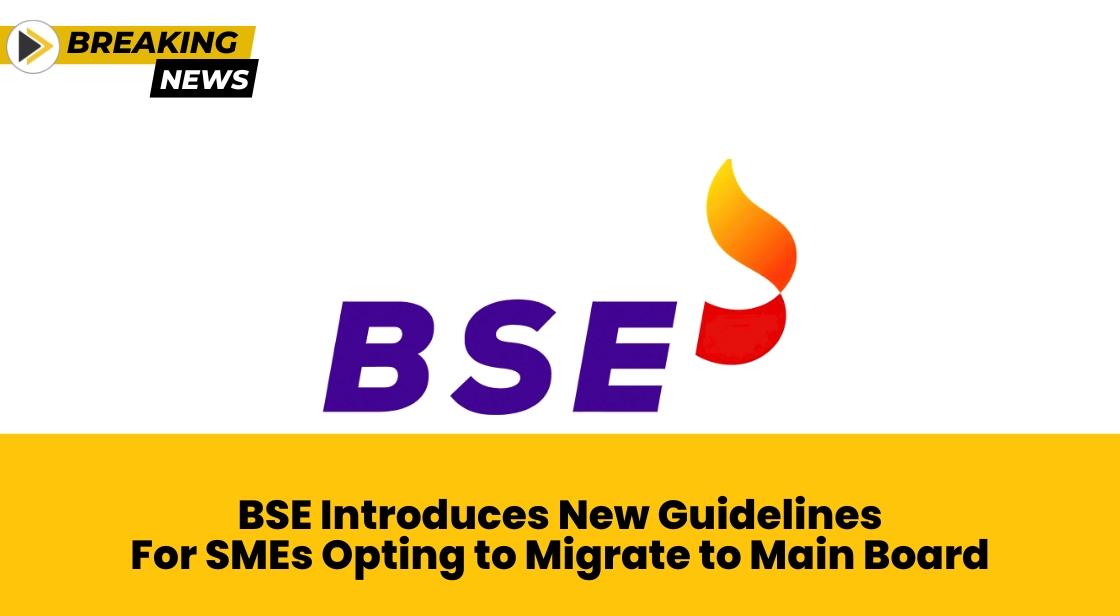BSE Introduces New Guidelines for SMEs Opting to Migrate to Main Board

News Synopsis
BSE, in its recent circular, announced upgraded guidelines for small and medium enterprises (SMEs) aiming to shift from the SME platform to the main board, set to take effect from January 1, 2024. This initiative aims to bolster the growth trajectory of these enterprises while maintaining robust financial standards.
BSE's SME Platform and Transition
Inaugurated in 2012, BSE's SME platform has been instrumental in aiding 464 firms to raise equity capital efficiently. The transition to the main board, considered a strategic move for SMEs, has been adopted by 181 enterprises, emphasizing the platform's significance in nurturing growth.
New Criteria for SME Migration
According to the latest guidelines outlined by BSE, several stringent yet essential criteria have been set for SMEs seeking migration:
-
Financial Stability: SMEs applying for the shift must boast a net worth of at least Rs 15 crore for the past two financial years, ensuring a stable financial foundation.
-
Duration on SME Platform: The SME should have a minimum listing tenure of three years on BSE's SME platform, signifying a sustained presence and operational consistency.
-
Shareholder Base: The company must demonstrate a broad shareholder base with at least 250 public shareholders before embarking on the migration journey.
-
Operational Performance: A positive operating profit for a minimum of two out of three financial years is a prerequisite, highlighting sustainable operational capabilities.
-
Profit After Tax (PAT): The SME must exhibit a positive PAT in the immediate financial year upon application for migration, ensuring profitability.
-
Capital Structure: The paid-up equity capital of the SME must exceed Rs 10 crore, indicating a robust capital structure.
-
Market Capitalization: A minimum market capitalization of Rs 25 crore is mandated, indicating market acceptance and stability.
-
Regulatory Compliance: Strict adherence to regulatory norms includes no winding-up petitions submitted to the National Company Law Tribunal (NCLT) and no history of trade suspension by any stock exchange in the past three years.
-
Regulatory Clearances: The SME, its promoters, and subsidiaries must not face any debarring by Sebi, ensuring compliance with regulatory authorities.
Benefits of Migrating to the Main Board
-
Increased visibility and credibility: Listing on the main board will give the SME increased visibility and credibility among investors.
-
Enhanced financial status: Listing on the main board will also enhance the SME’s financial status, making it easier to raise capital and grow its business.
-
Higher valuation: Listing on the main board can lead to a higher valuation for the SME’s shares.
BSE’s Commitment to SMEs
BSE is committed to supporting SMEs in India. The exchange has a number of initiatives in place to help SMEs raise capital and grow their businesses. These initiatives include:
-
The SME platform: BSE’s SME platform is a dedicated platform for SMEs to list their shares and raise capital.
-
The SME IPO Guidance: BSE’s SME IPO Guidance provides SMEs with the information and support they need to list their shares on the exchange.
-
The SME Incubator: BSE’s SME Incubator provides SMEs with access to mentorship, networking opportunities, and other resources to help them grow their businesses.
Conclusion
BSE's revised guidelines for SME migration to the main board underscore a commitment to fostering financial stability, credibility, and sustainable growth opportunities. These criteria act as guardrails, ensuring a smooth and prudent transition while upholding stringent financial standards.
You May Like









